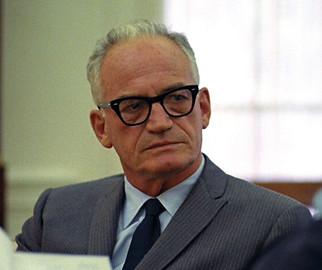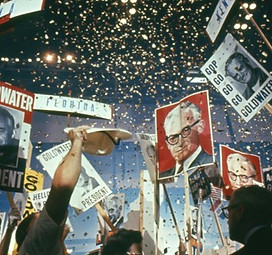Conservative Thought
GOLDWATER
After the founding of the National Review by William Buckley and the establishment of Young Americans for Freedom (YAF), conservatism developed a strong intellectual and political apparatus. Now conservatives needed to find a political leader behind whom the developing conservative movement could rally. Senator McCarthy was discredited; President Eisenhower had done little to strengthen the GOP; conservatives did not trust Richard Nixon’s accommodation tendencies, and Nelson Rockefeller was hopelessly liberal. Attention turned to a consistently conservative, westerner, Barry Goldwater.
Goldwater was from a wealthy Phoenix family. He had been involved in business, civic and political activities in Arizona in the 1930s and 40s. His political philosophy was rooted in his resentment against the New Deal. He was involved in local and state Republican politics for 20 years before running for the US Senate in 1952 against Ernest McFarland, who was the Senate Majority Leader.
Goldwater’s attacks against McFarlane were on the issues of the “Three C’s: Communism, Cronyism, and Chiseling.” Regarding the Democrat's deficit spending, he asked, “You know who’s going to pay this bill we’ve allowed to accumulate, don’t you? Our children are going to pay it and live with it for a long time.” (No truer words were ever spoken. We are still there trying to get Democrats from throwing money at everything.)


Goldwater, on the coattails of President Eisenhower’s win, eventually defeated McFarlane. He took his Senate seat, committed to standing for conservatism. Goldwater was not truly interested in the legislative process; but told Arizona, “My aim is not to pass laws, but to repeal them.” Goldwater openly opposed Eisenhower’s $71.8 billion budget calling it a “Dime store version of the New Deal.”
Goldwater, Buckley, Reagan, and the other messengers of conservatism began to labor hard for their beliefs. As the conservative movement took shape, Buckley encouraged Goldwater to make a manifesto to describe conservatism. The results were The Conscience of a Conservative, published in 1960. The book became a national best seller.
Goldwater began the book with the nature of man as a unique individual created by God in His image. He described man’s economic and spiritual dimensions as intertwined, making a man responsible for his own individual development, his own choices and his own pursuit of happiness. Given this understanding of human nature, the conservative political objective must be to achieve “the maximum amount of freedom for individuals that is consistent with the maintenance of the social order.” He concluded: “By reducing taxes and spending, we will not only return to the individual that means with which he can assert his freedom and dignity, but also guarantee to the nation, the economic strength that will always be its ultimate defense against foreign foes. "
By the fall of 1963, a draft "Goldwater for President" committee was gathering support. Opinion polls showed Goldwater within striking distance of John F. Kennedy. Goldwater and Kennedy who enjoyed a warm personal friendship while maintaining their philosophical differences, even discussed the prospect of running against each other in 1964 and tentatively agreeing to a series of Lincoln – Douglas type debates. Kennedy was assassinated in November and Goldwater seriously considered dropping out of the race. He said, “It is a great loss to the nation and to me.” Reluctantly, Goldwater agreed to run.
The fight for the GOP nomination began. Goldwater’s candor became a liability. Unrehearsed exchanges with the press, led to widespread misrepresentation and misinterpretation which soon pictured him as a merciless and trigger happy character. Secondly, Nelson Rockefeller launched vicious attacks on Goldwater in a desperate attempt to secure the GOP nomination. He characterized Goldwater as dangerously radical, intellectually shallow, and psychologically unstable.

The convention became a public disaster, not only for Goldwater, but the Republicans. The Republicans were unable to work together to compromise on a party platform. President Eisenhower was called upon to deliver a speech to hopefully bring party unity. Unfortunately, an interruption from the floor lasted 15 minutes and the outburst left the party chairman unable to restore order. The Republican Party had moved to the right and the ruling eastern establishment had been unwilling to acknowledge or accommodate the shift.
Goldwater’s fellow Republicans had destroyed his credibility and because of their division, the election would go to the Democrats. It was clear to Goldwater that the only thing he could do was issue a call to arms for conservatives. He began his speech: “Our people have followed false prophets. We must and we shall return to proven ways not because they’re old but because they are true.” He ended the speech with, “I would remind you that extremism in the defense of liberty is no vice. And let me remind you also that moderation in the pursuit of justice is no virtue.”
The war between liberals and conservatives still drags on, and unfortunately, the liberals are now going so far as to support socialism/communism. Conservatives have had their moments of shame where they refuse to stand in unity with their party. Maybe we need to take a long, heartfelt look to determine whether we are conservatives or not.
(Information taken from Conservative Heroes by Garland S. Tucker III)
kln
Therefore, my beloved brothers and sisters, be steadfast, immovable, always excelling in the work of the Lord [always doing your best and doing more than is needed], being continually aware that your labor [even to the point of exhaustion] in the Lord is not futile nor wasted [it is never without purpose].
1 Corinthians 15:58 Amplified Bible